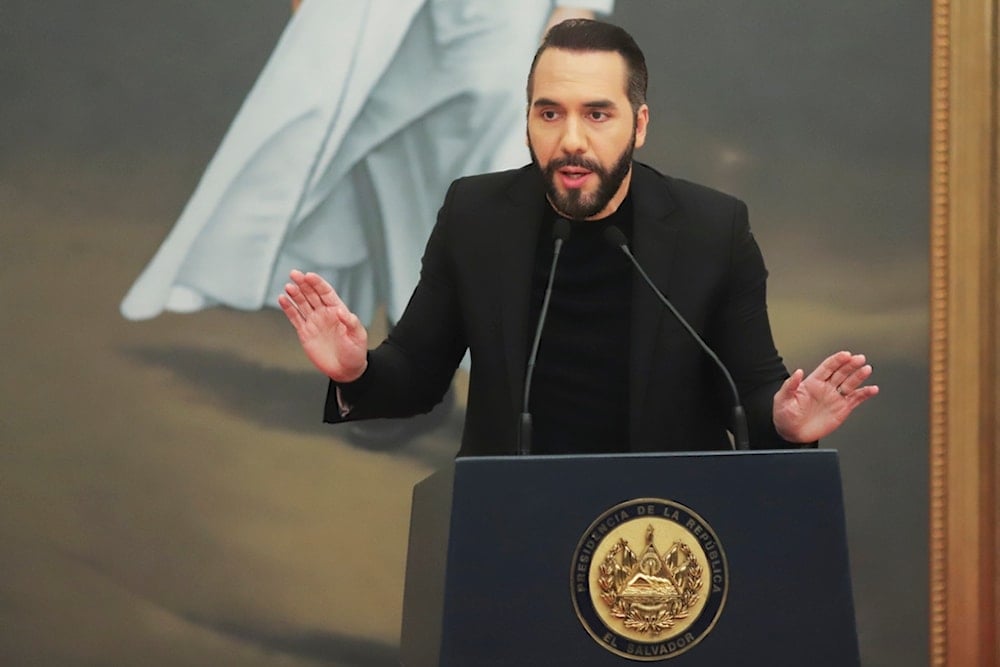El Salvador approves indefinite reelection for President Bukele
El Salvador's pro-Bukele legislature has approved constitutional reforms enabling indefinite presidential reelection and extended terms, deepening concerns over authoritarianism amid rising repression and democratic backsliding.
-

El Salvador's President Nayib Bukele gives a press conference in San Salvador, El Salvador, Tuesday, January 14, 2025. (AP Photo/Salvador Melendez)
El Salvador's Legislative Assembly, dominated by President Nayib Bukele's New Ideas party, passed a series of constitutional amendments on Thursday that pave the way for indefinite presidential reelection and extend the presidential term to six years.
The move is raising alarm both domestically and internationally over what critics describe as the continued erosion of democratic safeguards and the entrenchment of authoritarian rule.
The reforms, introduced by New Ideas lawmaker Ana Figueroa, amend five key articles of the country's constitution. In addition to allowing unlimited reelection and longer presidential terms, the changes eliminate the second-round runoff in presidential elections and propose that Bukele's current term, originally set to end in 2029, terminate in 2027.
This adjustment would align presidential and congressional elections and allow Bukele to seek another, now lengthier, term two years earlier than expected. The vote passed with 57 in favor and only three opposed, with no substantive debate preceding the decision.
#ElSalvador Con 57 votos a favor y 3 en contra, la @AsambleaSV aprobó el acuerdo de reformas constitucionales que habilita la reelección presidencial indefinida.
— Revista GatoEncerrado (@GatoEncerradoSV) August 1, 2025
Tras la votación, el presidente de la Asamblea cerró la sesión plenaria y convocó a una nueva para esta misma noche a… pic.twitter.com/XusxejaWjc
Figueroa defended the amendments by pointing to the reelection rights granted to other public officials. "All of them have had the possibility of reelection through popular vote, the only exception until now has been the presidency," she argued.
Assembly Vice President Suecy Callejas framed the reforms as a democratic empowerment measure, stating, "Power has returned to the only place that it truly belongs ... to the Salvadoran people."
However, the decision was met with fierce opposition from the few dissenting lawmakers. Marcela Villatoro of the right-wing Arena party called the reforms catastrophic, "Democracy in El Salvador has died!" she declared.
"You don't realize what indefinite reelection brings: It brings an accumulation of power and weakens democracy ... there's corruption and clientelism because nepotism grows and halts democracy and political participation."
Authoritarian Consolidation
The legislative maneuver follows a controversial 2021 ruling by the Constitutional Chamber of the Supreme Court, whose magistrates had just been replaced by Bukele's allies in the Assembly. That ruling lifted the constitutional ban on consecutive reelection, effectively clearing the way for Bukele to run again in 2024, an election he won by a landslide.
Since that power shift, Bukele has steadily consolidated control across all branches of government. In addition to removing top judges and the attorney general, his party passed legislation that reduced the number of Assembly seats and municipalities, reshaping the electoral map in his favor. Critics warn that these reforms, taken together, have eroded the last meaningful checks on executive power.
Despite the growing outcry from human rights groups and legal scholars, Bukele enjoys widespread popularity among the Salvadoran population, largely due to his harsh crackdown on gangs. His state of emergency policies, under which tens of thousands of people have been detained without due process, have been credited with significantly reducing violent crime.
However, rights organizations have documented widespread abuses, including arbitrary arrests and inhumane prison conditions.
Read more: Deported Venezuelan migrants recount abuse in El Salvador prison
Democratic Unraveling
In July, one of the country's most prominent human rights organizations announced its withdrawal from El Salvador, citing increasing political repression, the arrests of critical lawyers, and an overall environment of fear and retaliation. Observers liken the atmosphere to that of other authoritarian regimes in the region, warning that the Salvadoran democratic framework is being hollowed out from within.
International reaction has varied. While the Biden administration initially expressed concern over Bukele's dismantling of democratic institutions, US criticism has largely faded. Since Donald Trump's return to the White House earlier this year, Bukele has found a powerful ideological ally. Shortly after Trump's inauguration, the Salvadoran government agreed to accept over 200 deportees from other nations, many accused of gang affiliation, into a newly constructed mega-prison, a move welcomed by Trump's administration and touted by Bukele as a gesture of "regional responsibility."
President Bukele has not yet issued a statement regarding the passage of the constitutional amendments, but analysts say his silence is consistent with a leadership style that increasingly relies on action over dialogue—backed by popular support and unchecked by institutional resistance.
With the legal framework now reshaped to his advantage, Bukele appears ready to entrench his hold on power for years to come, an outcome that critics argue threatens to turn El Salvador's electoral democracy into a veneer masking unchecked authoritarianism.

 4 Min Read
4 Min Read








